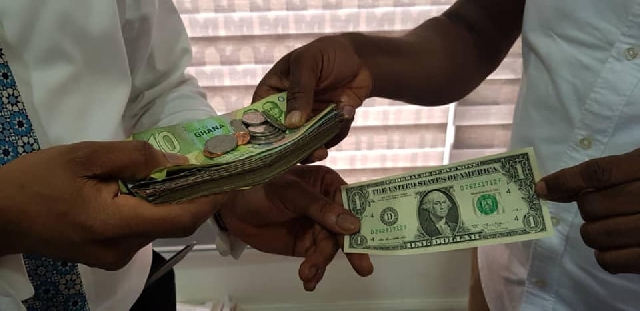The Ghana cedi will end this year at GH¢6.18 to the dollar, according to projection by Databank Research.
This will be 3.02% lower than the 3.9% depreciation recorded last year.
According to Databank Research, the mid-year rate of the Ghanaian local currency to the dollar will however be GH¢6.04 pesewas.
“The Ghana cedi appears well supported for another year of relative stability but not without pressure points. We forecast full year 2021 depreciation range of 3.02% – 6.18%”, it said in its 2021 Economic Outlook Report.
Factors that could support the Ghanaian local currency this year include the planned Eurobond issuance in the first quarter of this year and a modest recovery in oil export receipts without significant loss in gold revenue.
Others are continued use of domestic interest rates to attract foreign portfolio inflows, which is already showing positive prospects after the December 2020 elections and the continued Bank of Ghana interventions in the spot and forward market.
Already, the Bank of Ghana’s forex forward calendar for this year shows a stronger commitment to support the cedi through the first quarter of this year.
This Databank Research believes this deepens its optimism about a stable foreign exchange outlook.
“However, the cedi could be weighed down by a recovery in the import bill as economic activity rebounds. The risk of sudden foreign capital outflows amidst the elevated financing pressure is also noteworthy”, the report emphasized.
Benefits of stable cedi
A stable currency will boost spending in the economy as the purchasing power of consumers remain strong.
Secondly, it makes imports less expensive and thereby reduces imported inflation.
Cedi records almost 1.0% appreciation in January 2021
The cedi ended the first month of this year with a marginal gain of almost 1.0%, as it is presently trading at about GH¢5.90 pesewas to the US dollar on the interbank forex market.
This positioned it as one of the best performing currencies among 15 sub-Saharan African currencies including the Egyptian pound and the Nigerian naira.
The cedi lost about 3.9% in value to the dollar during the whole of last year, and analysts attributed it to largely the country’s diversified exports.
Currency analyst, Courage Martey told Joy Business the stable picture for this year’s outlook is same as last year.
“The cedi has started the year in a similar fashion as it did in 2020 and year-to-date it seems to have recorded an appreciation. The year-to-date gain against the US dollar is about 1.0%, and that is good news for importers because their cost of sales is supposed to be stable at worst.”
“And whiles cost of sale is not going up then there is no incentive to push up the prices of the goods that you are selling and so it also benefit consumers, it benefit businesses and it benefit the whole economy because once the cedi is doing quite well it boost investor confidence”, Mr. Martey said.
Latest Stories
-
Syria’s minorities seek security as country charts new future
11 minutes -
Prof. Nana Aba Appiah Amfo re-appointed as Vice-Chancellor of the University of Ghana
18 minutes -
German police probe market attack security and warnings
18 minutes -
Grief and anger in Magdeburg after Christmas market attack
19 minutes -
Baltasar Coin becomes first Ghanaian meme coin to hit DEX Screener at $100K market cap
1 hour -
EC blames re-collation of disputed results on widespread lawlessness by party supporters
1 hour -
Top 20 Ghanaian songs released in 2024
2 hours -
Beating Messi’s Inter Miami to MLS Cup feels amazing – Joseph Paintsil
2 hours -
NDC administration will reverse all ‘last-minute’ gov’t employee promotions – Asiedu Nketiah
2 hours -
Kudus sights ‘authority and kingship’ for elephant stool celebration
2 hours -
We’ll embrace cutting-edge technologies to address emerging healthcare needs – Prof. Antwi-Kusi
3 hours -
Nana Aba Anamoah, Cwesi Oteng special guests for Philip Nai and Friends’ charity event
3 hours -
Environmental protection officers receive training on how to tackle climate change
3 hours -
CLOGSAG vows to resist partisan appointments in Civil, Local Government Service
4 hours -
Peasant Farmers Association welcomes Mahama’s move to rename Agric Ministry
4 hours

